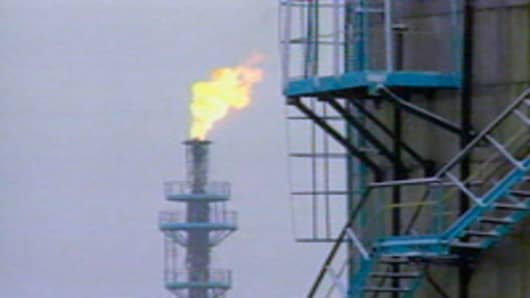Investors are divided over the direction benchmark oil prices will take this week amid lingering concerns surrounding Europe's debt crisis and renewed geo-political tensions focused on Iran's nuclear program, CNBC's weekly survey showed.
Five of the week's sample group of 11 respondents said prices would climb this week while an equal number said they would fall. One respondent in the survey expected prices would remain unchanged.
U.S. crude futures pushed above the century mark last week for the first time since July stoking inflationary fears and potentially undermining hopes of a consumer-led recovery should prices remain elevated for a sustained period particularly ahead of the key holiday season.
Prices eased Friday with benchmark crude falling $1.41 a barrel to finish at $97.41 in New York, in light trading ahead of the Thanksgiving holiday week.CNBC's survey last week correctly predicted that oil prices would not be able to hold above $100 a barrel.
Matt Grossman, Chief Equity Market Strategist for the Adam Mesh Trading Group, said if yields on benchmark European sovereign bonds continue to rise, “it will be difficult for oil to sustain levels over $100 because of the fear of another global recession.”
Policy responses from the Organization of Petroleum Exporting Countries and the International Energy Agency to high energy prices will be closely watched. Kuwait's oil minister Mohammed al-Busairi last week said OPEC will need to approve increase in production at its Dec. 14 meeting in Vienna.
Meanwhile, Rostam Qasemi, Iran's oil minister the OPEC member would use oil as a political tool if it was forced to do so. “We are not interested in using crude oil as a tool,” he said in an interview with Al Jazeera. “ And right now, we believe everything's okay and that there is no need to use crude oil as a tool. However, I have to reiterate that in case we are urged to and in case we think it's necessary: yes, we will use this.”
Though headline risk out of the Eurozone continues to be paramount for global financial markets, recent U.S. datahas suggested the economic recovery is starting to gain moderately more traction. A data-heavy calendar this week — which includes second-quarter GDP, Fed minutes, durable goods order and personal spending — may prove supportive for cyclical commodity markets like crude oil and copper if the numbers are consistent with a steady recovery.
“Given that recent data has improved we may see this data surprise further to the upside and this would boost crude prices and push equities higher,” said Peter Turville-Ince, Head of Commodity & Equities Strategy at Compass Global Markets. “The fact that prices remain so well bid in the face of very bearish sentiment signals to us that prices could rise further and when traders start to focus on U.S. data again and not so much on European problems we could see a dramatic move higher.”
Turville-Ince expects support towards $95.00 will hold for another move higher in coming weeks. “We remain neutral in the short-term until we see a bottom confirmed by a close back above $98.40 and then $100.00. Above here we will be short-term bulls and we could see an explosive move towards $105-$110 if the USD weakens and equities rally from here.”
Still, “downside risks still remain as European concerns continue to diminish any positive sentiment so support at $97.50 is important initially and then lower at $95.00,” he added.
From a technical perspective, Dhiren Sarin, Chief Technical Strategist, Asia-Pac at Barclays Capital said while he was sticking with his call for an uptrend in U.S. crude futures towards $105.15, “overstretched conditions remain a concern as does the USD bid and general euro-zone concerns reflected in French yields accelerating higher.”
He added: “As such, we would flip to bearish on a close back below $99.85 and assume that a near term top is in place.”


